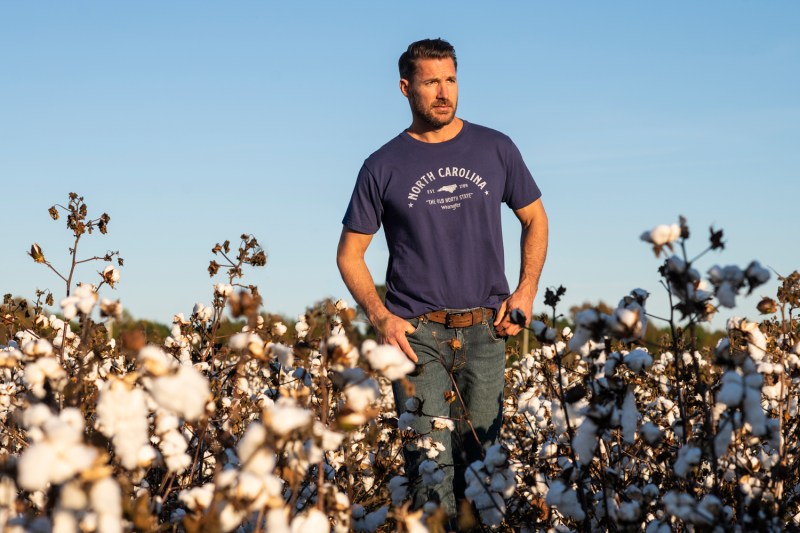
The Wrangler name conjures up images of cowboys and rodeos, an iconic dream of the West, as well as the classic rebellious American, rock-and-roll attitude. Like many modern denim brands, Wrangler is recognizing that, to thrive in today’s market, a sustainable approach to fashion goes a long way. Beyond a simple marketing message, though, Wrangler is truly embracing a “do well by doing good” message, looking out for what’s best for our planet and not only the bottom line.
Wrangler has been around for more than 70 years and can be found just about anywhere, from the local tack shop to Target to high-end boutiques like Los Angeles’s Fred Segal. If you follow the business pages, you’ll know it’s part of Kontoor Brands, Inc., spun off from apparel behemoth VF Corporation earlier this year. The publicly traded company now includes sister denim brands Lee and Rock & Republic. Wrangler is one of the leading brands in the Western market and is recognized as a go-to value-priced jean, but it also — like many heritage brands — has established itself squarely in the hardcore denim market with collaborations with high-end brands like White Mountaineering, artist Peter Max, Vans, even rapper Lil Nas X. The limited-edition Fred Segal collection was pulled from Wrangler’s archives and was handmade at the Wrangler Service Supply Center in Greensboro, North Carolina. Some pieces were even created with Cone Mills denim, which is also headquartered in Greensboro.
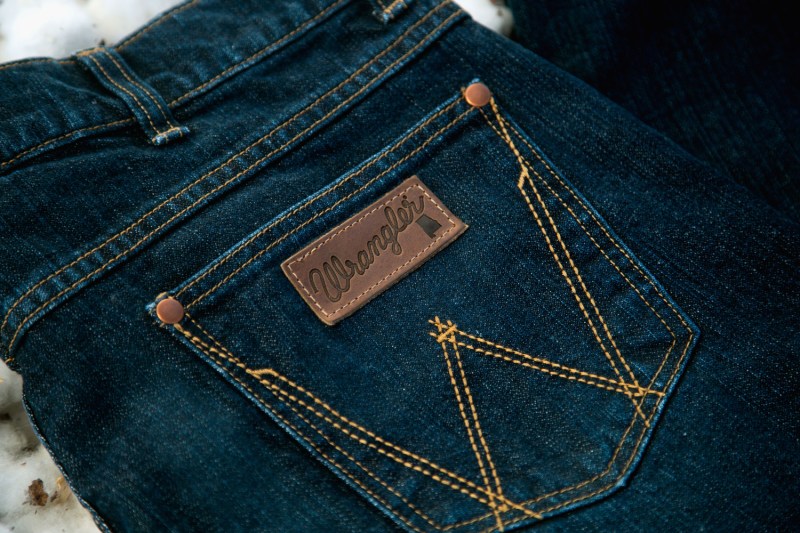
Roian Atwood is Wrangler’s director of sustainability, overseeing a companywide shift in behavior. He’s got the chops for it: a Duke University grad with a masters in environmental management, his first role was with American Apparel, then Etnies. He later did some consulting for Radio Flyer (yes, the little red wagon company), Annie’s (of organic mac and cheese fame), and several Colgate-Palmolive brands before heading to Greensboro.
“I’ve always had a focus on sustainability,” says Atwood. “It’s sort of my passion. I cultivated my academic studies on it and put all my energy into it. Wrangler is such a rich, amazing brand with a deep American heritage that it’s been a really fun journey to collaborate with everyone from the product team to the marketing folks and management.”
Atwood’s manifesto for the company is sober and hopeful. “We have a responsibility to care for the planet and the people who call it home,” says Atwood. “It all starts with respect for both. The Wrangler brand started with pioneers on the range … innovators and stewards of the land. We want to continue that tradition, finding new ways to care for the land and new ways to embrace sustainability. We want to be positive, working closely with our partners, our supply chain, our workers, and our neighbors across the world. I think it’s really important that sustainability evolves, that it evolves with the team, and that it embraces a sense of urgency of today’s global issues.”
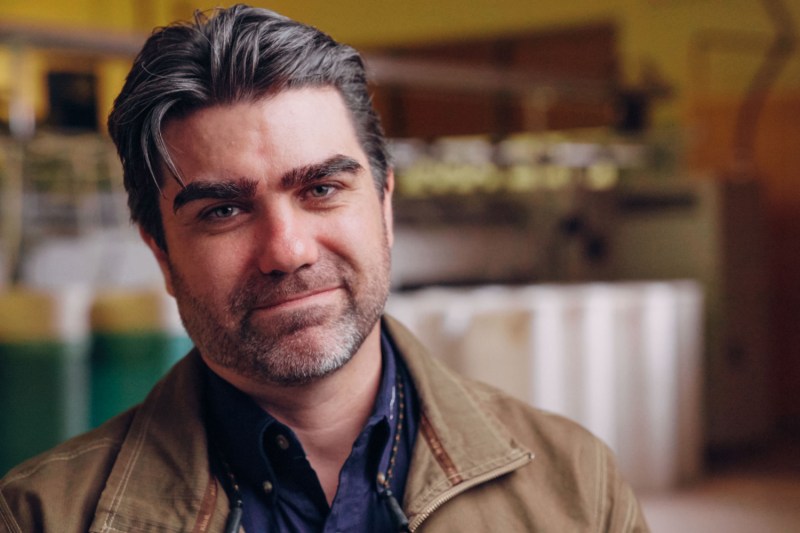
With a loyal brand following, international distribution, and a far-flung supply chain and manufacturing base, we can imagine that it must be tough for Atwood to — pardon the expression — wrangle the disparate communities under his trust.
“The Wrangler brand started with pioneers on the range … innovators and stewards of the land. We want to continue that tradition, finding new ways to care for the land and new ways to embrace sustainability.”
“It’s true! We have a diverse consumer group, and we’ve had to be creative in how we approach sustainability. We’ve had to really listen, empathize, and understand the big challenges that face that population. A good example would be the way we’ve adopted a sustainable cotton platform. People are naturally going to gravitate toward certifications and management schemes that are governed by non-profits, and there’s nothing wrong with that. But for example, when we spend time with United States-based cotton growers — and as much as 80% or more of our cotton comes from the U.S. — we learned about land stewardship practices that farmers could enact almost immediately, so mentally, that was a gateway for them to change practices and achieve more regenerative outcomes.”
Atwood elaborates, “Cover crops, conservation tillage, and complex rotation sequester carbon. Those three practices drive water into the water tables, retaining it better in soil during times of drought. Understanding the environmental benefits, but also the cultural challenges we face in adopting sustainability, and how to navigate them, has become part of our approach. We’ve really been able to customize it and make it more democratic so more people have access to sustainability. No one should be posed with the question ‘Do I pay more for a sustainable product or not?’ That doesn’t seem right. We should be able to offer sustainable products at an honest price.”
But does that put management on edge?
Further Reading
- The Future of Jeans Is Here with these Alternative Fabrics to Cotton Denim
- 7 Best Men’s Jeans and Denim Brands on the Market
- A Guide to Raw Denim Jean Selection and Care
“I think we have to show a cadence of smart projects. It’s true, we are a publicly traded company now, and we have a commitment to shareholder return. What we do is find a sweet spot of efficiency; reducing energy costs, chemical inputs, and overall water consumption. That all offers an operational advantage and has a cost savings associated with it. We quantify that savings and put out projects that have aggressive [returns on investment]. We do two or three of those projects, and then maybe the fourth is a little more aspirational, where we ask the company to invest in something that, rather than just offering payback, offers improved reputation, innovation, or value to the industry, and isn’t just about financial diligence.
Since Wrangler isn’t exactly an upstart boutique denim brand with a cult following, we wondered how Atwood implements his ideas at scale.
“We do play in the premium denim space,” he offers. “It’s actually a great place for us to put something into the market and add new sustainable attributes, selling it to a more fashion-oriented consumer that is concerned about what’s in their product. They have the chance to participate and sort of lead the charge. The Rooted collection is a great example: it retails for $100 — still not falling into that spectrum of the $220 jean, but at the same time that’s a big jump for someone who’s used to paying $20 a pair at a mass retailer — and if we can drive those sustainable attributes and that storytelling in the premium line, then we can go through the exercise of finding ways to bring it to other levels of distribution. It sometimes means removing some design features that might be more costly.”
“No one should be posed with the question ‘Do I pay more for a sustainable product or not?’ That doesn’t seem right. We should be able to offer sustainable products at an honest price.”
Wrangler’s Rooted Collection works with domestic farmers to create traceable, locally sourced denim and knit fabrics. The cotton is grown and milled in Alabama, Georgia, North Carolina, Tennessee, or Texas. Denim is then woven in Georgia, and jeans, designed in tribute to each state, are cut and sewn in Texas. Other cotton is spun, knit, dyed, cut, sewn, and printed in the Carolinas for a coordinating graphic T-shirt collection. The family farms supplying the cotton are part of Wrangler’s Science and Conservation program, which advocates for land stewardship and best practices that result in crop resilience, improved yield, reduced water and energy use, fighting erosion, and reduced greenhouse gas emissions. Wrangler’s goal is to source 100% of its cotton from farms using these practices by 2025.
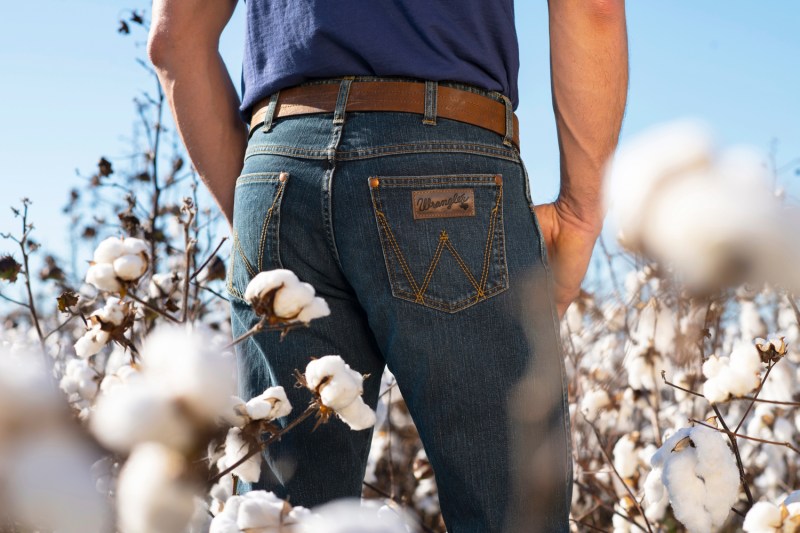
Of course, getting Wrangler’s supply chain on board with environmentally friendly practices has been one of Atwood’s biggest challenges to date. “Five years ago we invested in a project with Texas Tech University, creating a small start-up company with some entrepreneurs who came up with a new way of applying indigo dye to denim, using a foam process, rather the traditional method of running yarns through chemical baths. The foam is almost like a cappuccino, touching the surface of the yarn in a closed environment. The beauty is that the foam is mostly air, so you don’t use all that water. It reduces 60% of the energy used and 60% of the waste. We’ve taken the technology from a trial in Lubbock, Texas to a manufacturer in North Carolina who made the machine, and finally, the first pilot was in Spain with denim manufacturer Tejidos Royo. This is not something we want to own: this is something the entire world needs to access. Projects like these involve long learning curves and all kinds of failures in the adoption, but after five years, we really have something to show for it … we’re pretty jazzed!”
Wrangler’s Indigood collection, utilizing the new technology, features a pair of classic, full-cut jeans, a denim jacket, and Western shirt in light and dark washes; selling for $100 to $150.
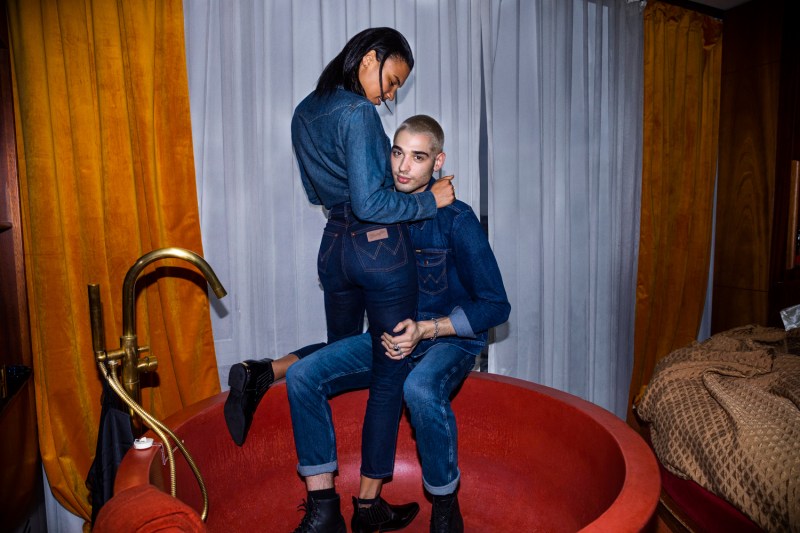
With all of that under his belt, what are the next steps for Atwood? “Two things. One is working on using renewable energy for any company operation, and manufacturing has to be priority number one. We need to implement solar and wind on a large scale. Companies need to do whatever is in their power to transform their energy footprint. From a global issue, climate change is connected to so many other environmental challenges. Second is that we cannot be content with our agricultural practices. Our number one material input is still cotton, and our agricultural systems have the opportunity to transform the world. If we use our soil as a carbon sink and use regenerative practices; pushing the envelope on novel practices, then our land will end up becoming part of the solution, not part of the problem. If we conserve soil, it becomes a thriving, living biological community that will support future generations of fiber, fuel, and food crops in a way we’ve never seen before.”


